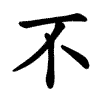不
Hello, you have come here looking for the meaning of the word 不. In DICTIOUS you will not only get to know all the dictionary meanings for the word 不, but we will also tell you about its etymology, its characteristics and you will know how to say 不 in singular and plural. Everything you need to know about the word 不 you have here. The definition of the word 不 will help you to be more precise and correct when speaking or writing your texts. Knowing the definition of不, as well as those of other words, enriches your vocabulary and provides you with more and better linguistic resources.

Ordine dei tratti 
ordine dei tratti (animazione) 
(kanji di grado 4)
Goon: fu, hochi
Kan'on: fū, futsu
Kan'yōon: bu
Kun: sezu, niarazu, inaya
Def: non

不 (vai ai composti)
Hanzi tradizionale e semplificato; 4 tratti, radicale 1 (一)+3
Significato (come carattere):
- non
- no (utilizzato per dare risposta negativa alle domande; si noti che tuttavia è molto più comune, soprattutto in contesi formali, formare la negazione ripetendo il verbo)
- realizza la costruzione (verbo)不(verbo)..., che rende la frase interrogativa (si veda anche 吗)

- pinyin: bù (nb: prima di un quarto tono, ad es. 是 (shì), va pronunciato come un secondo tono: bú shì)
Ascolta la pronuncia :
→ Etimologia mancante. Se vuoi, aggiungila tu.
- 沒 (t.) / 没 (s.) (méi - non; il suo utilizzo al posto di 不 è obbligatorio prima di alcuni verbi, come 有, e in alcune costruzioni sintattiche); 別 (t.) / 别 (s.) (bié - non; realizza l'imperativo negativo)

Goon: fu, hochi
Kan'on: fū, futsu
Kan'yōon: bu
Kun: sezu, niarazu, inaya
Def: non
不 (kanji di grado 4)
- Goon: ふ (fu), ほち (hochi)
- Kan'on: ふう (fū), ふつ (futsu)
- Kan'yōon: ぶ (bu)
- Kun: せず (sezu), にあらず (niarazu), いなや (inaya)
不
Composti
- 不安 (fuan)
- 不一 (fuitsu), 不乙 (fuitsu)
- 不運 (fuun)
- 不壊 (fukai)
- 不易 (fueki)
- 不可 (fuka)
- 不可解 (fukakai)
- 不快 (fukai)
- 不許 (fukyo)
- 不具 (fugu)
- 不倶戴天 (fugutaiten)
- 不言実行 (fugenjikkō)
- 不孝 (fukō)
- 不幸 (fukō)
- 不治 (fuji)
- 不死身 (fujimi)
- 不悉 (fushitsu)
- 不肖 (fushō)
- 不祥 (fushō)
- 不詳 (fushō)
- 不祥事 (fushōji)
- 不浄 (fujō)
- 不精 (bushō)
- 不尽 (fujin)
- 不宣 (fusen)
- 不戦 (fusen)
- 不全 (fuzen)
- 不善 (fuzen)
- 不測 (fusoku)
- 不足 (fusoku)
- 不定 (futei)
- 不貞 (futei)
- 不逞 (futei)
- 不敵 (futeki)
- 不当 (futō)
- 不凍 (futō)
- 不備 (fubi)
- 不敏 (fubin)
- 不憫 (fubin), 不愍 (fubin), 不便 (fubin)
- 不服 (fufuku)
- 不文律 (fubunritsu)
- 不平 (fuhei)
- 不変 (fuhen)
- 不満 (fuman)
- 不毛 (fumō)
- 不問 (fumon)
- 不埒 (furachi)
- 不慮 (furyo)
- 不倫 (furin)
- 不老 (furō)
- 不惑 (fuwaku)
- 不束 (fusoku)
- 不思議 (fushigi)
- 不知火 (shiranui)
- 不如帰 (hototogisu)
- 不見転 (mizuten)
- cinese
- MDBG Chinese-English dictionary, ricerca per "不"
- Zhao Xiuying, Franco Gatti, Dizionario compatto italiano-cinese e cinese-italiano, Zanichelli, pagina 42
- Zhang Shihua, Dizionario di cinese, Hoepli, pagina 30
- Chiara Romagnoli, Grammatica cinese, Hoepli
- giapponese
- Denshi Jisho - Online Japanese dictionary, ricerca per "不"